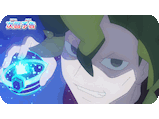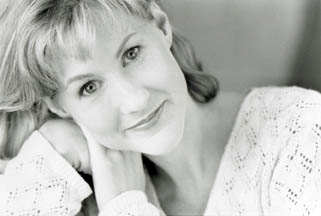
Interview



Main
Old Updates Archive
Links
 |
Lists |
List of Pokémon
Pokémon World Atlas
List of Techniques
List
of Items
List of Anime Episodes
 |
Guides |
Episode
Comparisons
Movies
& Specials Guide
CD Guide
DVD Guide
Voice
Actors Guide
Lyrics Archive
Manga Guide
Video Games
 |
Miscellaneous |
Humor
Pokémon Bashing
Features
Rants

Below is an interview with Veronica Taylor, voice actress of Ash and Ash's mom in Pokémon and Amelia in The Slayers. The interview originally appeared in Animerica Volume 8 #7.
Veronica Taylor also has her own website at http://www.veronicataylor.net/. The site hasn't been updated in ages ("Keep watching every week for new Pokémon Johto League episodes!") but is still worth a look.
As an actor, Veronica Taylor is classically trained performer, with a BA and an MFA in the art and years of experience in voice-overs and commercials. However, her anime voice-acting career began casually, when she was recruited by her acting coach as a young female voice. Simply by “just being at the right place at the right time,” she’s become one of the best-known voices in America as Ash, the star Pokémon trainer in the Pokémon TV series.
“Pokémon doesn’t take up a lot of time--it’s really just two days a week, but it’s been my main focus,” Taylor says. “I’m just pretty much available whenever they need me.” In fact, she has few other projects in the works to report because, lately, as she says, “I’ve been consumed by Pokémon.” But even with such a public voice, she doesn’t exactly have the problem of people recognizing her voice on the street--in fact, it seems that most people, even fans, barely have an idea who she is. “I have received three pieces of fan mail,” Taylor laughs. “Sometimes if I’m on the subway and kids are talking about Pokémon, or maybe looking at their trading cards or something, I’ll ask them questions about the show, and maybe I’ll whisper, in my Ash voice, in their ear,” Taylor laughs. “But I’d never do the voice with face attached to it because it would blow the whole cover, you know. Although most kids don’t seem to mind that the voice of Ash is played by a girl. Most kids don’t believe it, but then they say, “Well, how did you win that badge?"
Part of the problem is that Taylor just hasn’t had much chance to get to know her many fans, or meet them face to face at conventions, although she says she’s definitely interested. “I just don’t have the time to travel to those; I haven’t been able to do anything like that. I have hosted two AOL online chats. In that way, I’ve talked to the fans a little bit, and I’m amazed by what people know and how much information they have. Especially that so many people like to draw and are really involved in writing and are also involved in anime. I’m always interested in hearing feedback from people and getting their ideas on things
Were you quite a fan of animation?
I’ve always loved
animation.
I grew up on a lot of Disney cartoons-Fantasia, Sleeping
Beauty, and Cinderella, those ones. I
loved Speed
Racer when I was growing up.
Oh, really?
And Kimba.
Those were really big for me. I’ve always been a huge Scooby-Doo
fan and huge cartoon fan. I guess it has always been a dream of
mine
to be able to do voices for cartoons. Although I love acting on
stage
and I certainly wouldn’t want to give that up, but it’s definitely a
great
job. Sort of that dream-come-true thing.
When you were young, would you try to imitate your favorite voices?
I’ve never done
that.
I know there are a lot of people who do, but I don’t really do a lot of
voices. I think when I go to an audition, if we see the
character,
or for anime if we get to hear the Japanese voice sometimes, then you
have
an idea of what they’re looking for.
The intonation and whatnot?
And the pitch of
the voice.
So for that, I kind of play [my performance] off that or what the
character
seems to be, and just kind of throw it into a voice. I don’t
really
have a bag of voices that I use. I mostly just interpret, and see
what happens.
You said that you initially got your first job because they were looking for a “young woman” type of voice. Do you find that you are usually cast for those roles, or are you more versatile?
I think my range
right now
is the high, young voice--I have the boy voice now. Sometimes in
my mid-range—I play Ash’s mom in Pokémon
—and then I also get those low, sultry voices sometimes, so there is kind
of a range, I would say. I do audition for the same people a lot,
so I am allowed a stretch in there. Often you have to be
pigeonholed
just to start getting work, and then you’re allowed to expand your
repertoire.
I’m at a point right now where they know me, so they can say, “Well, I
think she can do this role,” and then I can audition for it.
Okay. Is there a particular type that you are more comfortable with?
Well, at the
moment, with
playing Ash and playing Amelia, it’s really great for me. Playing
a 10-year-old boy with that energy and excitement, and the battles that
he’s in, and his low, husky voice is really terrific. Ameila is
on
the flip side of that, and it’s a great release to have her and not be
stuck in that Ash-ville. [LAUGHS] It’s really great,
because
she is so high, and when you’re talking in a high voice it kind of
gives
you a head rush, so I have a great buzz coming out of recordings for
Amelia.
I’m very comfortable with those, and that I get to do them over and
over-it
has been really nice.
In your experience, having been a fan of animation when you were younger and working in Japanese animation now—what do you think are the main differences between Japanese animation and American animation?
My brother
says—my brother
who is 11—says that in Japanese animation the tongues are always pink.
[LAUGHS] That’s true, that’s what he has noticed. I think
that
the artwork of it is very different. The color, and, I hate to
say,
the simplicity of it, because it’s really not just that the
style
is so different.
You mean it’s more natural?
I don’t
know. If you
look at Batman: The Animated Series and Pokémon,
the styles are so completely different. A lot of it is the color
and the largeness of picture. There’s such finite detail in, say,
Batman
and it’s not so much in Pokémon. It’s
broader
strokes. Right now there seems to be so much more anime on TV
that
you can pretty much tell right away. A common thing in anime is
that
the eyes are so much bigger and rounder than what American cartoons
have,
but those are such simplistic observations. [LAUGHS].
Well, thematically is there anything that strikes you?
Well, you know I
think that
for most anime that I’ve seen, it seems like there are definite morals
within the stories. Just to pick on Pokémon
for one example, it’s always about being truthful and about loyalty to
your friends and you’re always learning something about yourself or how
to be in your community, I think. That I find more than in
American
cartoons, that they do try to teach lessons, however hidden they might
be. But they do teach you something, or try to.
Has your impression of your character, Ash, changed over time because you’ve been doing the show for quite some time now?
I don’t
know. I think
the scripts are changing a little bit. He’s gotten a little more
courageous, I think. I really enjoy playing him and he’s really a
great character, so that hasn’t changed, but I feel that after the
first
ten episodes everything has kind of loosened up. The script’s
loosened
up, the characters were able to come into their own a bit more, and I
think
everyone has relaxed a bit; we’re able to play with it more, whereas in
the first ten episodes, I think it was so new, and everyone was just
trying
to make sure it was done right. Even in Japan, I feel that was
really
hard. I enjoy playing him now much more than I did in the very
beginning
because I can have fun with him more, and we kind of know him and can
work
out how he really would react. We have the classic Ash responses
[LAUGHS] and things like that. I definitely have more fun playing
him now than in the very beginning.
How does it feel knowing that you are a part of this giant cultural phenomenon? Let’s face it, everyone knows what Pokémon is.
[LAUGHS]
Yeah, it’s
pretty exciting, I have to say. I always wanted to do something
on
PBS, something that was good for kids, so this is the next best
thing.
It’s not on PBS and we have commercials running with it, but at least
it
is teaching kids something. It s a good show, so I’m pretty proud
of that. I’m also pretty invisible with the whole thing, so it’s
my own personal feel-good thing—I don’t get much recognition from the
public
from the people I work for, so it’s low-key on that side of it. I
feel very great about it and really proud of it, and we really try to
make
sure that the grammar is correct and small things like that to make
sure
it’s a really good show, as much as we can.
Getting back to the whole acting aspect, I’m sure you’ve acquainted yourself with other people in the voice-acting trade. Have you discovered that a lot of the best voice-actors come from acting backgrounds or are those not necessarily related?
Well, I think
from what I’ve
heard, from the directing side of it, that it’s easier to work with
people
with an acting background because they’re able to…Well, first of all,
we
never see the episode first—we just get our scripts and then we go in
and
read our lines, and never see what goes on in between. So it’s
kind
of up to me to skim through the script and interpret what’s going
on—interpret
how the person before me would ask the question so that I can answer
it,
because we rarely here the other voice. You’re in the room alone,
and you’re not answering anyone, you’re not talking to anyone, you’re
making
it all up. I think that an acting background does help in that
because
you’re able to form the whole story for yourself and you don’t have to
rely on other voices to act off of. I think that does help.
But some people have no acting background but natural talent.
They
have a great voice and they’re able to throw it in there and they just
can do it. I would like to think that you need an acting
background
but some people…
Some just have the aptitude for it.
They do.
But for me,
[acting training] definitely helps because I’m able to use my
background
in it, and I think it makes for a richer character.
If I were to approach you at a big anime convention you were attending and ask your advice in how to get started in voice-acting, what would you recommend?
Well, I
think…gosh, it’s
so difficult. Especially because in being a voice-actor there is
so much competition, and like I said, the way I got in was pure luck,
really.
But before that was a lot of hard work, and I studied and I really made
sure, first of all, that acting was something I wanted to do.
People
say, “If there’s anything else you can do, do that instead.” So I
think the advice is to study and learn as much as you possibly can in
all
areas. I have a BA in theater—I didn’t go to a conservatory
school
just for acting for college because I think you need to have a
well-rounded
background in life. I think that [your life] informs your acting,
and I think you need to study as much as you can in all
aspects,
and that will inform your acting career and then you have to pursue...I
don’t know how anyone gets into voice-acting. [LAUGHS] You
need to make a voice tape, that’s probably one thing, because you have
to have something that shows what you can do for people. It is just
your voice, and they don’t need to know that you look like at all—they
just need to hear an example of your voice. That tape is your
calling
card.
It sounds like you should not commit yourself solely to this. Diversify your interests.
Yeah, I think
so. Also,
as an actor, you have to be ready to do any work that comes along
because
you don’t know what will come up. You do have to diversify your
talents
and you have to make sure that you’re prepared for anything.
Speaking of things coming up, do you have any new projects on the horizon, or is it just more Pokémon?
Right now, we’re
doing the
second movie of Pokémon. We’re continuing
with The
Slayers—Slayers Try, I believe it is, and the
third
season of Pokémon has just started. That’s
pretty
much what I’m doing right now, other than auditioning for other
projects
that come up and trying to get other work coming. I’m incredibly
busy but, as with most acting, I don’t have anything to show for
it.
[LAUGHS] It’s all in the works, y’know.
Do you have any interests in the technical aspects of your job? I know that a lot of voice-actors seem to end up either directing or scriptwriting.
I do have an
interest in
both scriptwriting and directing, although the timing is not good for
me
right now. But I definitely have interest in those, and if the
opportunity
were given to me I would definitely take it.
Do you have a closing message for your fans out there who will be reading this interview?
Oh God!
[LAUGHS]
Well, I don’t know. My whole thing is always so corny but I think
people really need to follow their dreams, and I know that this has
been
something for me that I have always wanted and it has worked out.
It’s always so corny.
It’s only corny if you convince yourself that it is. It’s worked out for you.
[LAUGHS]
Yeah, it has.
You know, I hope that can be in some way inspiring, and that people can
just keep going, no matter what career they choose, that sometimes it
really
seems hard and bleak but if you persevere I really believe it can work
out for you.
|
Veronica
Taylor |
Found an error or omission? Please help me keep this page current and error-free by e-mailing me with a description of the issue.

